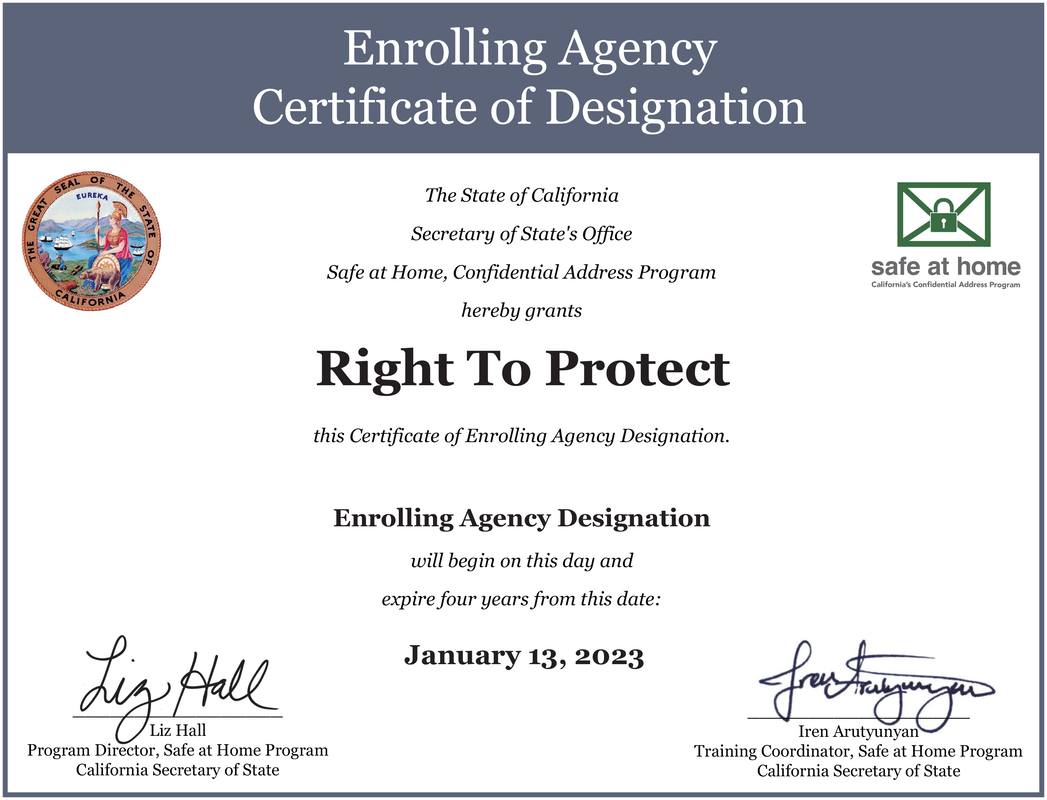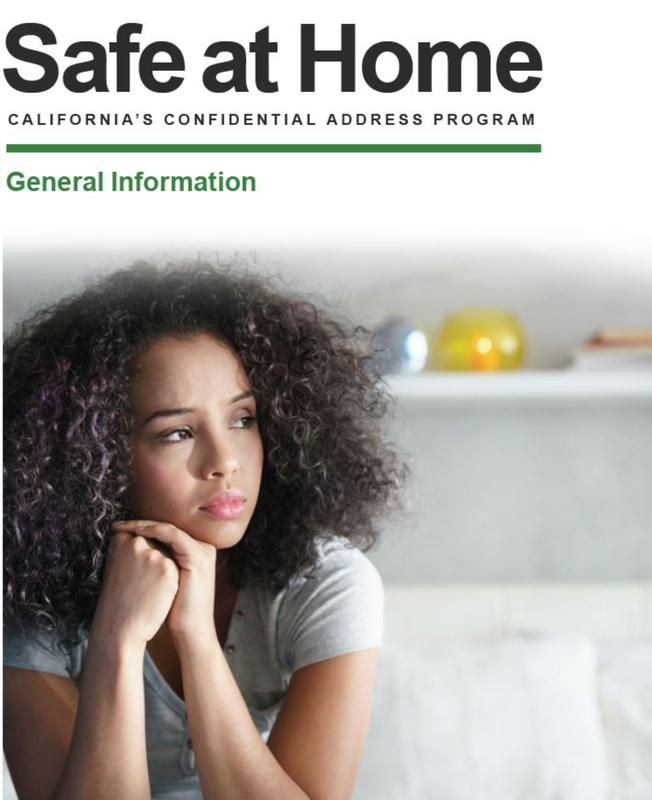Right to protect is a safe at home enrolling agency
Right to protect is not bound by the restrictions that all too often come with public grant funding. Right to Protect will assist with applications for anyone who otherwise qualifies for participation in the program, regardless of where they reside (within the State of California), or their "victim type". We are not just an enrolling agency but our Founder has been a Safe at Home participant since 2011 and is intimately familiar with how the program works and how to implement the measures afforded participants under the law.
For more information or to enroll, call / text us at (209) 595 - 8248 or email us at [email protected]
Our assistance with the SAH program doesn't stop at enrollment applications. If a participant needs assistance implementing any of the measures available to them under the program, such assistance is available through Right to Protect.
Information on the safe at home program:
What is the California Safe at Home program?
Safe at Home is a confidential address program administered by the California Secretary of State’s Office. When used as part of an overall safety plan, Safe at Home offers program participants a substitute mailing address to receive first class, certified, and registered mail.
Once a participant qualifies for the free program, the Safe at Home P.O. Box becomes their official address. State and local government agencies are required to accept the Safe at Home address on the participants’ identification card; however private companies and the federal government are not.
How does the California Safe at Home program work?
Who is eligible?
Applicants are eligible to participate if they:
What are the services provided?
Safe at Home provides the following:
Once enrolled, participants can choose from several services that may strengthen their overall safety plan.
Optional services offered by other California government agencies include:
Who needs to comply?
Safe at Home is a confidential address program administered by the California Secretary of State’s Office. When used as part of an overall safety plan, Safe at Home offers program participants a substitute mailing address to receive first class, certified, and registered mail.
Once a participant qualifies for the free program, the Safe at Home P.O. Box becomes their official address. State and local government agencies are required to accept the Safe at Home address on the participants’ identification card; however private companies and the federal government are not.
How does the California Safe at Home program work?
- Mail is forwarded to participants at least three days per week.
- All Service of Process documents are delivered to the Safe at Home Program and then forwarded to the participant via certified mail.
- The initial enrollment period is four years.
- Participants have the option to renew every four years.
- Government agencies are notified, in writing, of a participant’s withdrawal or termination from the Program.
- All first class, certified and registered mail is forwarded to the participant’s mailing address on file with Safe at Home, at no cost to the participant.
- Safe at Home does not forward packages, magazines, catalogues, prescriptions, liquids, or fragile items.
Who is eligible?
Applicants are eligible to participate if they:
- Reside in California
- Are a victim of domestic violence, stalking, sexual assault, human trafficking, elder or dependent adult abuse, or a reproductive health care worker
- Are a household member of a victim listed above
- Are in fear for their safety, or for the safety of a minor child or incapacitated adult
What are the services provided?
Safe at Home provides the following:
- Confidential mail forwarding
- Agent for Service of Process
- Confidential voter registration
- Use of the designated Safe at Home address and PO Box number by California state, county, and local government agencies when creating or modifying a public record
- Renewable Safe at Home enrollment
Once enrolled, participants can choose from several services that may strengthen their overall safety plan.
Optional services offered by other California government agencies include:
- Department of Motor Vehicles Records Suppression Program
- Confidential name change petition through the California Superior Court system (*Right to Protect is the only organization throughout the entire State of California that offers assistance with the Confidential Identity Change process.)
- Confidential Vehicle Smog Certificate through the Bureau of Automotive Repair
- Online privacy protection through the office of the California Attorney General.
Who needs to comply?
- State and Local Government: Pursuant to Government Code, sections, 6207 and 6215.5 a program participant may request California state, county, city agencies and the courts to use his or her designated Safe at Home mailing address . When creating or modifying a public record (excluding the record of any birth, fetal death, death, or marriage certificates), state and local government agencies shall accept the designated address as a program participant's substitute address, unless the California Secretary of State's office has determined both of the following:
- The agency has a bona-fide statutory or administrative requirement for the use of the address which would otherwise be confidential under this chapter.
- The address will be used only for those statutory and administrative purposes and shall not be publicly disseminated.
- Private Businesses: California businesses can play an important role in preventing the exchange and sale of confidential address information. According to Section 6208.1(b)(1) of the Government Code, a Safe at Home participant may make a written demand of a person, business, or association to remove any display of their home address or telephone number from the internet.
- The California legislature has provided Safe at Home participants with a civil remedy for failure to comply with their demand. However, the Safe at Home program does not monitor or enforce compliance.
- Information for Banks: A ruling (FIN-2009-R003) by the United States Department of Treasury Financial Crimes Enforcement Network or FinCEN, issued on November 3, 2009, allows financial institutions to use an address designated by the Safe at Home Program instead of the confidential residential address of the participant.
- Schools: Schools may have an administrative need to know a program participant's residential address to determine students' district zone, as well as for administrative and emergency purposes. While public schools must keep the program participants residential address confidential, it is further recommended that all schools use the Safe at Home Program participant's designated Safe at Home mailing address on any mailings and public documents.
- Law Enforcement: California law requires all local and state government agencies to accept a Safe at Home Program participant's designated mailing address. Law enforcement agencies are not excluded from this rule. Law enforcement agencies are expected to comply with the same statutory obligations as any other state or local government agency.
- Real Estate Transactions: The California legislature, in Government Code Section 6209.5(a), authorizes Safe at Home participants to request that their residential address be replaced on real property deeds, change of ownership forms and deeds of trust with their Safe at Home designated mailing address. The legislature requires California government agencies to comply with the participant's request per Government Code 6207(a)(1) unless certain governmental circumstances apply.
- The Safe at Home program participant will present his or her Safe at Home laminated Authorization ID card (or letter of participation) to you.
- The Authorization ID card (or letter of participation) will contain the participants name on file with the program, his or her program identification number, the designated mailing address, and an expiration date.
- Call the Safe at Home program, toll-free, at (877) 322-5227, to confirm the active status of a program participant.
Safe at Home Program participants will receive the following:
Participant Responsibilities:
As a Safe at Home participant, you agree to the following or it may result in cancellation from the program:
Safe at Home Program participants have the same legal responsibilities as the general public when interacting with law enforcement.
- A Participant Guide detailing the services and responsibilities of participation (Welcome Packet).
- If you are interested in a Confidential Name Change (CNC), for you and / or your minor children, you can request that a CNC Packet be sent to you along with your Welcome Packet at approval of your application.
- Minor children must be enrolled into the SAH program to be eligible to a CNC.
- If you are interested in a Confidential Name Change (CNC), for you and / or your minor children, you can request that a CNC Packet be sent to you along with your Welcome Packet at approval of your application.
- A substitute mailing address to use with California state, county and city government agencies in lieu of a residential address.
- An Authorization ID card.
Participant Responsibilities:
As a Safe at Home participant, you agree to the following or it may result in cancellation from the program:
- Mail Forwarding:
- Mail will be forwarded to the address provided by the participant. The participant is responsible for collecting their mail. If mail is returned to the Safe at Home program, participation may be cancelled.
- Participant Must Notify Safe at Home Within 7 Days:
- Change of residential address
- Change of mailing address
- Name Change
- Participants who wish to remain in the program after their initial four year term, should renew their certification before their term expires by completing and submitting the renewal materials sent by Safe at Home.
- Participants who wish to withdraw from the program must notify the Safe at Home program in writing. Participation is terminated upon receipt of the request and mail will be returned to the sender.
- The program participant's certification term has expired and certification renewal has not been completed.
- The program participant no longer resides at the most recent residential address provided to Safe at Home, and has not provided at least seven days prior notice in writing of a change of address.
- A service of process document or mail forwarded to the program participant by Safe at Home is returned as non-deliverable.
- The program participant obtains a legal name change and fails to notify Safe at Home within seven days.
- The program participant, who reaches 18 years of age during his or her certification term, has not renewed his or her certification within 60 days of him or her reaching 18 years of age.
- The Safe at Home Program has determined that false information was used in the application process to qualify as a program participant or that participation in the program is being used as subterfuge to avoid detection of illegal or criminal activity or apprehension by law enforcement.
Safe at Home Program participants have the same legal responsibilities as the general public when interacting with law enforcement.
verification of application
Right to Protect provides verification's of application to those who apply for the Safe at Home Program through the organization. There is no personally identifying information tying the applicant to the application; this is done for the safety of the applicant. In the event that an applicant requires it, Right to Protect can provide a statement verifying that the application number found in the verification of application belongs to the applicant.
In addition to providing record of the application submitted, the verification of application is intended to satisfy orders made by the court that an individual apply for participation in the Safe at Home program in order to keep their address confidential (common in Family Court cases where abuse is alleged and disclosure of one parents address to another presents a credible risk).
In addition to providing record of the application submitted, the verification of application is intended to satisfy orders made by the court that an individual apply for participation in the Safe at Home program in order to keep their address confidential (common in Family Court cases where abuse is alleged and disclosure of one parents address to another presents a credible risk).
disclaimer
While Safe at Home cannot provide legal services or advice in accordance with the aforementioned Government Codes, listed below are the links to professional legal services and state and county agencies where Safe at Home participants may seek professional legal advice.
California Bar Association (Includes addresses and telephone numbers of legal providers by county):
www.calbar.ca.gov/public/lawyerreferralserviceslrs.aspx
California County Bar Associations (Lists all available county bar associations):
www.barassociationdirectory.com/ca/
California Bar Association (Includes addresses and telephone numbers of legal providers by county):
www.calbar.ca.gov/public/lawyerreferralserviceslrs.aspx
California County Bar Associations (Lists all available county bar associations):
www.barassociationdirectory.com/ca/
*The information found on this page was taken directly from the California Secretary of States Safe at Home program website and informational materials; all of which has been included here for your convenience. For more information or to visit the program website, please go to: https://www.sos.ca.gov/registries/safe-home or call them at (877) 322-5227.



